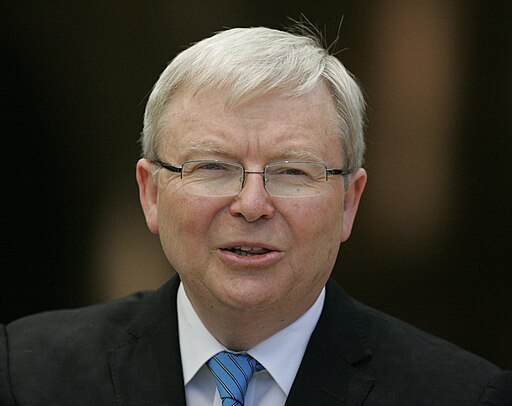Opposition foreign spokesman Simon Birmingham expresses hope that Trump will overlook Rudd’s previous attacks, stressing the importance of Australia’s US relationship
As tensions simmer over the future of Australia’s diplomatic relationship with the United States, opposition foreign spokesman Simon Birmingham has expressed hopes that Donald Trump will extend forgiveness to Kevin Rudd for past personal attacks on the president-elect.
Birmingham’s comments came during a National Press Club address in Canberra on Wednesday, where he outlined the coalition’s foreign policy approach, emphasising the importance of repairing any potential rifts that could hinder Australia’s relationship with the US. The remarks reflect growing concerns within Australian politics about the implications of Rudd’s past criticisms of Trump and the potential consequences for his current role as Australia’s ambassador to the United States.
“Hopefully, the forgiveness that has been shown to other members of the new administration will be extended to Ambassador Rudd as well,” Birmingham said. He pointed to the nomination of Marco Rubio for Secretary of State, despite Rubio’s history of sharp criticisms aimed at Trump, suggesting that similar reconciliatory gestures could be made towards Rudd, despite his outspoken remarks in the past.
Embed from Getty ImagesRudd, who congratulated Trump following his electoral victory, had previously been critical of the then-presidential candidate, and the fallout from these past statements has sparked concerns within the Australian government regarding the ambassador’s effectiveness in influencing outcomes critical to Australia’s interests.
The comments come amid a broader discussion on Australia’s role in navigating global power dynamics, particularly between the US and China. Birmingham noted that it would be up to Prime Minister Anthony Albanese and Ambassador Rudd to assess how well Rudd could continue to represent Australia in Washington in the wake of his past remarks. “It will be their job to determine how effectively he can maintain influence with the new administration,” Birmingham said, underlining the significance of Australia’s diplomatic relationships.
In the same address, Birmingham was asked about Australia’s stance on potential military involvement in Taiwan in the event of a Chinese invasion. In response, he refrained from committing to military action, acknowledging the unpredictability of such a situation. “It is too early to say how Australia will respond to any potential conflict. Our priority is to prevent such a situation from arising,” he said. The coalition’s focus, according to Birmingham, is on working closely with international partners to deter aggression before it escalates.
This position reflects the delicate balancing act Australia faces as a middle power with strategic alliances to manage. Birmingham also took aim at Prime Minister Albanese’s comments about Australia’s role in managing competition between the US and China, remarking that the country is “a few steps away” from playing a central role in such geopolitical tensions.
On the topic of Russia’s ongoing aggression towards Ukraine, Birmingham reiterated the coalition’s stance on ensuring that Russia faces consequences for its actions. He called for a “just peace” in Ukraine, one that preserves Ukrainian sovereignty and sends a strong message to the international community about the consequences of aggression. Birmingham further emphasised that any peace deal must ensure Ukrainian security while deterring future acts of aggression.
He also made it clear that while the coalition supports the US-led efforts in Ukraine, Australia’s alignment with the US on the conflict’s resolution may not be unconditional. Birmingham outlined that the coalition would not hesitate to disagree with the Trump administration if the proposed end to the war did not align with Australia’s vision of a safe and secure Ukraine.
“How we define peace matters,” he said. “It’s not just about protecting Ukraine’s sovereignty but also about sending a message to countries like China and Russia about the consequences of aggression.”
With the US set to be a central player in shaping global security policies in the coming years, the Australian opposition’s foreign policy is keenly focused on ensuring that the country remains closely aligned with US interests while navigating the complexities of global geopolitics, especially in light of shifting power dynamics and the rise of China.
